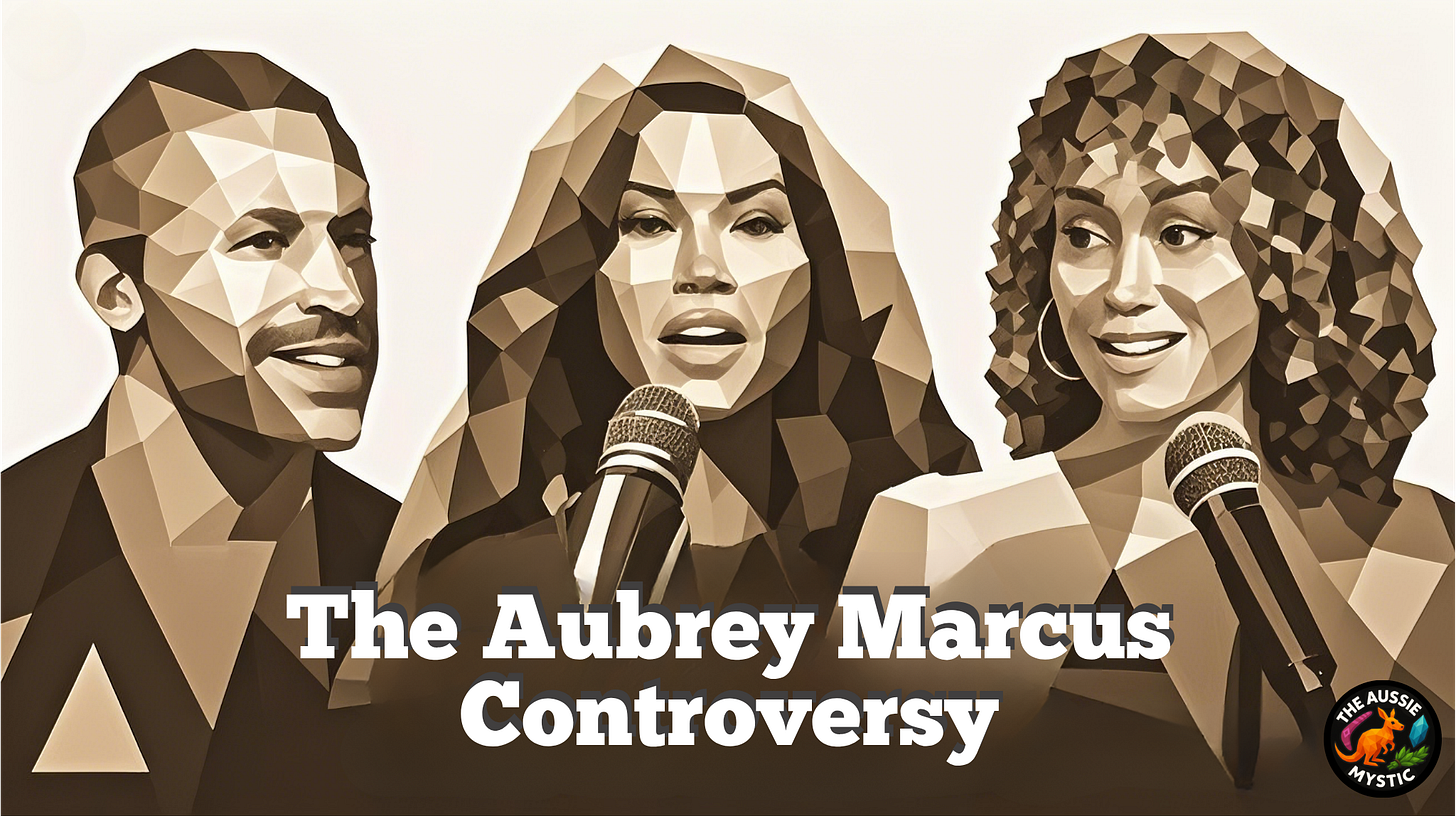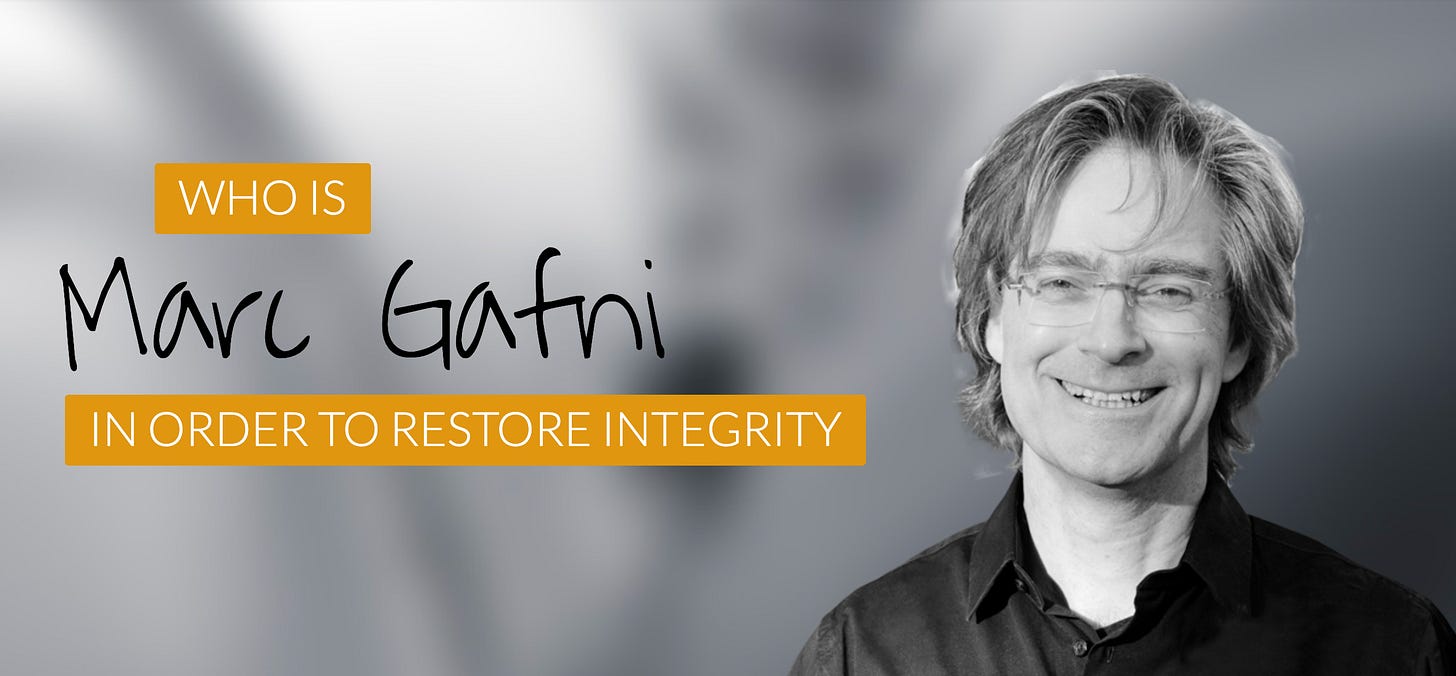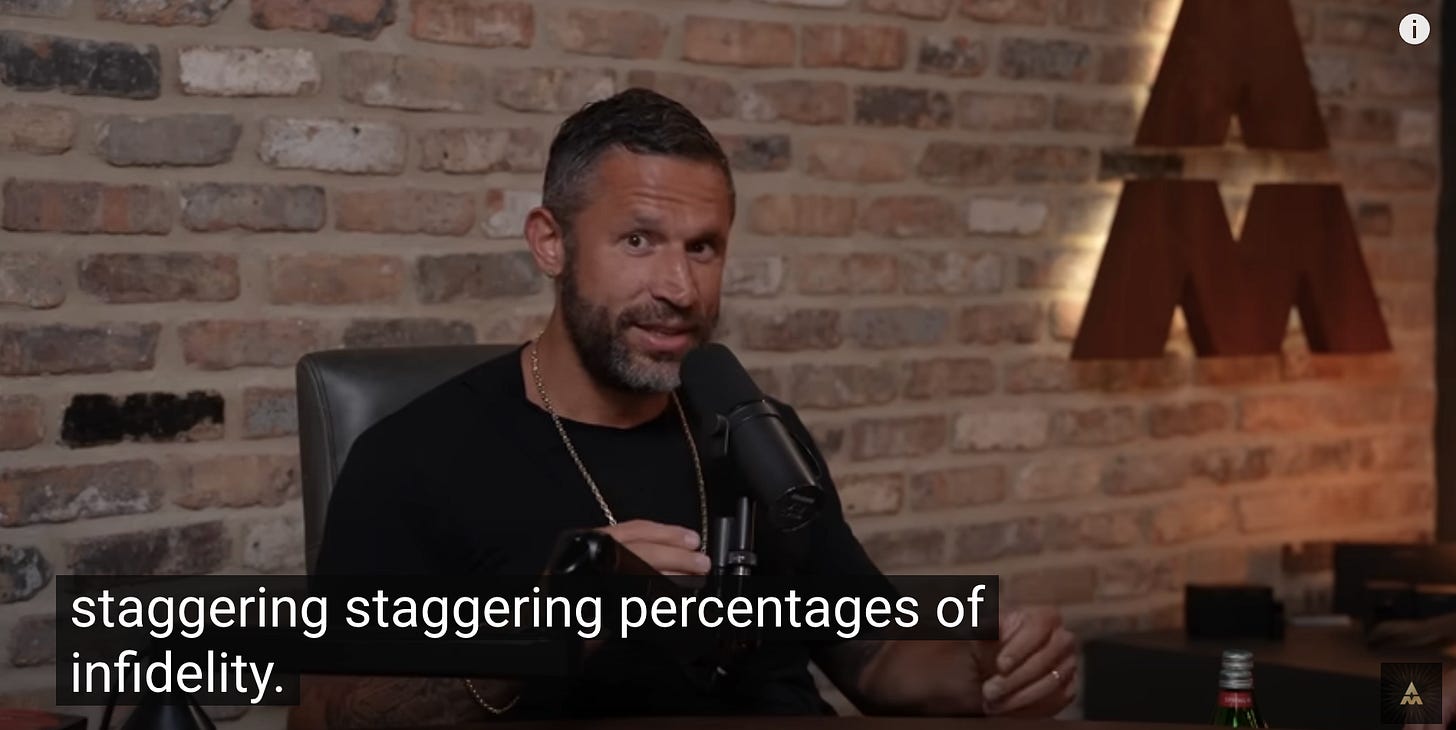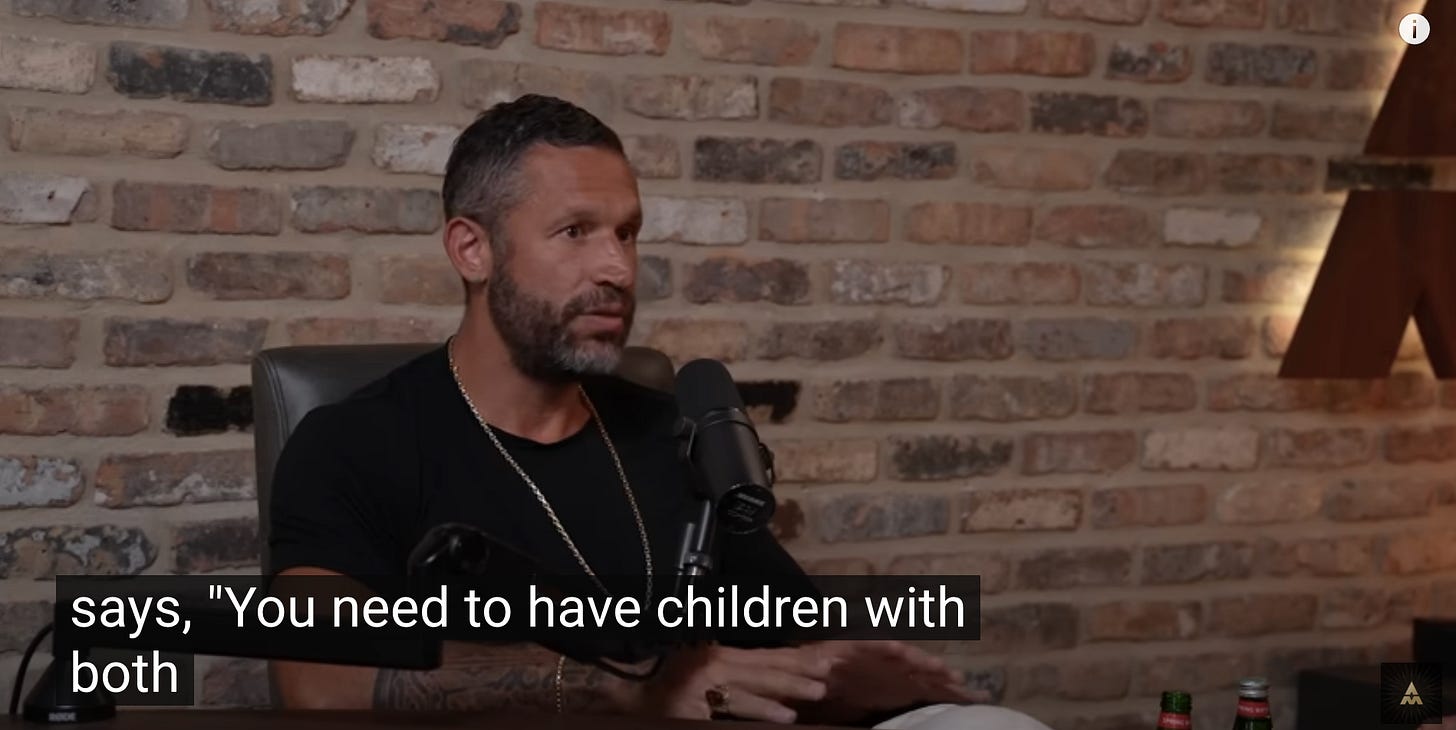The Aubrey Marcus Controversy: 3 Psycho-Spiritual Lessons
Vibe Report: The False Dichotomy of the Spiritual Bliss Junkie
This week, I want to talk about my latest hyperfixation: the mass calling-out of spiritual content creator Aubrey Marcus.
It’s captivated me the way a house fire might because the controversy has laid bare a string of psycho-spiritual confusions I’ve personally carried around for years. These confusions afforded me some great lessons, but also spurred a lot of pain.
If I can help someone else avoid falling into the same traps, I figured that would be a good use of my time—so here we go.
Who the Hell is Aubrey Marcus and What Happened?
I’ll give the backstory as efficiently as I can.
Marcus is a 44-year-old modern spiritual content creator who’s recently built a large following. He’s masculine on the surface but enjoys poetry and frequent participation in “medicine ceremonies.”
Marcus is known for living a pleasure-centric lifestyle, which includes polyamorous relationships.
In the early stages of his relationship with his now-wife (Vylana; 38), she was hesitant about all this. But steadily, the pair shifted from a monogamish relationship into a non-monogamous arrangement.
One day, mid-workout, Marcus hears a voice he perceives as higher guidance. The voice tells him to pause his set and check his dating app because he’s going to meet someone important.
Enter: Alana (27)
The three hit it off, and Alana is added to the pair’s relationship structure.
But the mystical voice soon strikes again—this time in the Pyramids of Egypt—telling Marcus he now needs to impregnate both women.1
Reluctantly, but adhering to his belief in radical honesty and transparency, Marcus shares this revelation with his wife, and emotional turmoil erupts between them. Marcus assures Vylana that if she wants to leave him, he’ll take care of her financially.
She ultimately decides to stay.
This drama culminates in a podcast episode featuring Marcus, Vylana, and Alana, together with their “expert” teacher—a guy who has a whole website dedicated to defending himself against public controversy.2
In 2.5 hours, they describe where the relationship has landed: with Vylana having pushed through a mountain of “triggers” to arrive at “choosing this for herself.”
She cries a couple times throughout the episode, but all-in-all, their relationship structure is described by all in poetic, high-vibe terms—subtly-not-subtly presenting it as a new, possibly more enlightened evolution of union.
The result?
The entire spiritual community called “bullshit.”
Rather than the typical online vitriol, commenters and other content creators took time to respectfully explain the psychological and spiritual problems with the situation, and their responses blew me away.
They weren’t cruel. They were wise and loving.
Some came from spiritual teachers and theologians, others somatic therapists and psychologists—all nailing the issue from different angles.
So what did Marcus do for the finale?
He responded with another two-hour podcast episode, featuring his ex-fiancé as a character witness.
He framed the responses as bullying, fake-cried, and positioned himself as a martyr—claiming that if the world needed to falsely project onto him as a hiccup in their own spiritual evolution, he would accept that role as a catalyst for human consciousness.
Holy moly—AMIRITE?
Why This Captivated Me
Here's the embarrassing truth: If I’d heard that original podcast without the commentary surrounding it, I’d have bought everything they were saying.
Thankfully, the commentary did exist.
So, as I watched this spiritual car crash unfold, I felt knots of my own confusion—accumulated over years of navigating similar dynamics—slowly untangle. People far wiser than me were dissecting psychological patterns I'd previously found convincing and seductive.
Because here's the thing.
Much of what Marcus presents to his audience contains truth. Radical honesty is valuable. Examining our triggers can be transformative. But the problem isn't the concepts—it's how they're wielded.
Here are the three biggest distortions that came to light for me throughout this saga.
Fallacy 1: Total Honesty Is the Same as Moral Integrity
Marcus attempts to align himself with the queer community's struggle for authenticity, claiming he's simply living his polyamorous truth. At the same time, he positions his transparency as the loving alternative to betrayal, with frequent reference to infidelity statistics.
This is the spiritual loophole Marcus exploits the most: “I didn’t lie. I was radically transparent. Therefore, I’m acting with integrity.”
The truth?
Sometimes, true integrity sometimes means telling yourself the truth and then setting a boundary with yourself, the same way you’d say no to a child who wants candy for dinner.
Because not every impulse ought to be acted upon.
The internet highlighted what appeared to be some combination of a sex, love, and drug addiction, cataloguing Marcus as a “bliss-seeker”—a distorted type of spirituality where pleasure becomes an experience to be chased rather than a gift among life’s other feeling states.
This is essentially the “feminine” principle run amok.
Honesty. Love. Free-spiritedness.
These are good things, but only when accompanied equally by their healthy masculine counterpart. In the absence of this, you get an overabundance of the feminine. That is, chaos without boundaries.
My Experience
I recognize this pattern because I lived it.
I was recently in a relationship with someone who embodied pure feminine energy—chaotic, impulsive, child-like. Coming from my own over-dominance of masculine energy, I fell head-over-heels in love.
My nervous system was at the whim of this guy’s impulses—including his lust—and I tried to convince myself to be satisfied with the fact that he was at least honest and transparent about these whims.
Perceiving him as genuinely well-intentioned, I tried to namaste my way through red flags and understand the ways I must be the problem.
Was I too attached? Was I too judgmental? Did I just need to work through my triggers?
I woke up every morning feeling like I wanted to throw up, constantly bracing myself for whatever next spanner was about to hit me in the head.
I was both relieved and devastated the day I decided to throw in the towel.
Fallacy 2: Spiritual Surrender and “Surrendering to Every Impulse” are The Same
What Marcus fundamentally misunderstands is that being a man is about taking responsibility for your impulses, not just being honest about them. It's about building containers strong enough to hold your desires without them destroying everything you touch.
The fallacy here is that Marcus conflates spiritual surrender with surrendering to every impulse. But without practicing the masculine principle—structure, boundaries, responsibility—he’s neglecting the things he should actually be doing if he wants to grow and find peace with his wife.
Without the container masculine energy provides, “free love” becomes a euphemism for boundaryless indulgence—and it’s usually the woman’s nervous system who pays the price.
The sacred container of monogamy isn't about restriction. It's about creating safety.
When a woman feels genuinely secure in her man's devotion—when she trusts that his energy isn't scattered across multiple partners—she can relax into her own essence. This creates a feedback loop of mutual fulfilment that no amount of "radical fidelity"3 can replicate.
Can polyamory work? My guess is: Theoretically—with tremendous effort and resources.
But it requires a level of masculine presence and provision that most men simply can't sustain across multiple relationships. There are only so many hours in the day, and there is only so much emotional bandwidth to distribute.
Marcus seems far more interested in collecting peak experiences than in doing the mundane work of creating genuine safety and stability. In doing so, he’s trying to brute-force his way into paradise without understanding that, as a man, he's responsible for building its walls.
My Own Detective Work
I once knew someone who was running this same false logic.
Partying, sex, always on dating apps, drugs every weekend—together with his wild, free-spirited girlfriend. Their total openness, acceptance, and in-the-moment spirit was fascinating enough that it made me put on my detective hat and go undercover.
I decided to get lightly involved with them.
I sniffed away at their lifestyle, trying to figure out what the hell they knew that allowed them to be the way they were with all its admitted upsides.
But quickly, I discovered their chaos was completely intolerable to my nervous system.
Their lifestyle was one of intense highs, crashing lows, and a revolving door of lovers who seemingly couldn’t handle them either. They didn’t appear to be learning anything, and it was all clearly placing strain on the woman of the pair, who was the man’s emotional anchor whenever he felt distressed.
My girl hard-on dead, I slid off my disguise and slid on my stethoscope instead. I suggested to the male of the pair that he might want to learn some self-regulation skills—like meditation.
In response, he chose to wear his mental health diagnosis as a shield against a need to examine his behavior.
I was swiftly accused of being judgmental.
And with that, I quietly bounced.
Fallacy 3: Jealousy Is Always a Wound to Heal
Throughout the saga, jealousy is consistently framed as a "trigger" to be transcended or wound to be worked through. But this assumes jealousy is always a low-vibration kink in the system, rather than a feature of being human.
We sometimes feel jealousy in response to boundary violations.
Provided you are accurately perceiving the boundaries around what is yours, jealousy is the right emotion to feel when those boundaries get crossed. And—bit controversial—but it’s natural for a man to take what’s called “healthy ownership” of his woman.
If you’re wincing at this statement, that’s only because society has mistakenly convinced you that “ownership” and “control” are one and the same.
They are not. Go watch this video.
The spiritual community's tendency to pathologize all negative emotions as "triggers to transcend" reveals a fundamental misunderstanding of embodied spirituality. True spiritual development isn't about transcending our humanity—it's about learning to live in harmony with it.
We have negative emotions for a reason, and Marcus assumes that we’ve evolved past whatever jealousy’s purpose is—something we cannot know for sure.
I’m not speaking from the bleachers here.
I’ve been in an open relationship and can say from experience there is certainly benefit to confronting your jealousy head-on. For me, the buried content this relationship brought to the surface helped me resolve key insecurities and fears of abandonment.
So, I’m glad for those experiences.
But there's a profound difference between conscious exploration and spiritual bypassing—between examining your triggers and positioning every natural human response as a spiritual failing.
A man who channels his territorial energy into devoted protection and provision will find himself a woman who feels safe enough to fully surrender into her femininity.
In exchange for his devotion, he gets a container in which to still let his impulses have some free rein. Because a wife who feels your devotion, trusts you, respects you, and feels taken care of by you will be just as happy as you are when the sun sets and it’s time to have some fun.
Doesn’t that sound way better than a revolving door of flesh?
I sure think so.
It’s giving up to ultimately gain. You know—the delayed gratification we learned as kids?4 There’s a difference between undifferentiated love and wanting to stick your dick in everything.
The latter is positioning immediate pleasure as your god.
It’s positioning pleasure above the potential for something deeper and better. But to get there, you have to negotiate with the future—an essential skill we all need as grown-ups.
Marcus Missed the Mark
Here’s the crux.
Most of modern spirituality is a feminine response to the legacy of toxic masculinity. But in rejecting one distortion, we’ve embraced another.
Healthy love isn’t boundary-less. Healthy masculinity isn’t just honesty.
And the spiritual path doesn’t mean indulging every instinct under the guise of liberation. It means learning which instincts to honor and which ones to transform.
The Greek word for “sin” isn’t about wrongdoing. It means “to miss the mark.”
And on this one? Marcus definitely missed the mark.
Who knew I could write spiritual journalism? If you enjoyed the drama and downloads, subscribe to The Aussie Mystic, where I make sense of the woo so you hopefully don’t end up in a polyamorous pyramid scheme.
It’s worth noting that just because higher guidance steers you in a particular direction, it doesn’t mean that direction is going to end well for you. Half the time, we’re being steered toward our delusions so we can face whatever disappointment we need to face to clean things up.
I don’t go into Gafni’s backstory, but he’s got a very dark history. Check out this conversation to learn more.
This is the revised name they chose to give their relationship construct after initially naming it “radical monogamy in the field of erotic mystics.” For this, they’ve been criticized for steering humanity further in the direction of Upside-Down Land.
Mischel, W. (2014). The marshmallow test: Understanding self-control and how to master it. Random House.









This is a stunning analysis, Nicole. I want to acknowledge your labour in reviewing the entire Aubrey, Vylana, et al situation. Analysing it, your own journey, and processing that journey and putting it all in context. It's generous of you. Thank you. It offers me insight into a range of things that I've been thinking about for the last couple of years.